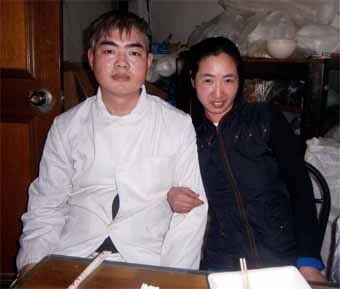
Finding the Right Aunt in China
| published October 3, 2015 |
By Michael Bush, Thursday Review contributor
Moving to China comes with all sorts of lifestyle changes for an expat family: grocery shopping every day rather than once or twice a week, using public transportation as your primary means of getting around, not having car seats for your young ones most of the time, and most likely hiring an ayi.
Ayi (阿姨), literally translates into English from Mandarin as “aunt,” and they are prevalent in China with middle to upper class Chinese families, and most especially with expats. An ayi (pronounced eye-yee) is a housekeeper, maid, babysitter, cook, personal shopper, and in many cases an adopted family member.
There are many ways in which ayis can be found and hired. All of the expat magazines have listings for housekeeping companies in the classifieds. Online message boards are full of posts from people leaving China trying to help their ayis find new jobs. On most little side streets, next to hundreds of realty offices, you can find tiny hole in the wall agencies where dozens of ayis looking for work sit around a table gossiping and waiting to be called in. But honestly, the best way to find an ayi is a recommendation from a trusted friend.
If you speak little to no Chinese, you’ll probably want to get some help negotiating the terms of your new ayi’s contract. Items like paid holidays, extra Saturdays for babysitting, start and end times, expected duties while on the job, hourly wages, etc. are all hard to discuss using only hand gestures.
And speaking of language barriers, hiring an ayi that can actually speak English is going to cost you an arm and leg. The affordable option, for us at least, was an ayi without any English at all. In this case, it’s best if you have a basic Chinese vocabulary. Even if you have to get a translator for the hiring process like I mentioned before, having a rudimentary grasp of Mandarin will enable you to communicate with your ayi throughout her time with you and your family.
I personally didn’t take any formal Chinese language classes until my final year in China, but listened to some language cd’s before arriving. This helped me initially communicate with our ayi, but all of my useful Mandarin was picked up talking to my ayi everyday. First learning how to say “In Mandarin how do you say…?” while pointing to everyday objects was a real help in developing my vocabulary. Then I built my skills from there.
Not only can an ayi help your language development, clean your home, babysit your children, do your shopping, cook your meals, and speak to random people that knock on your door, they can help you assimilate to life in China. If you let them become part of your world, they will in turn let you become part of theirs.
Our first ayi, however, is barely a memory. She was a flash in the pan, gone in a blink; a mere brush up against the arm of our time in China. I don’t even remember her name. All I can recall about her time with us is that Joyee, the local fixer provided by the school that hired my wife, connected us with this woman. He brought her to the house and translated for us, as my Chinese was abysmal at that time, and she spoke little to no English.
He helped me schedule the days and times we needed her, negotiate pay, and explain what we wanted; simple and easy. She came on the prescribed days and times, and cleaned like a maniac. She was brilliant and I loved not having to do the housework.
We shared her with another expat family, which is often the case, unless you hire an ayi full time. Many of the more affluent families choose this route, often having the ayis live with in them in their home. I worked for one very wealthy family who had three and sometimes four ayis living and working in their very large house.
However, We only needed the ayi two times each week, which meant she needed more work. The family we shared her with had already been using her services for a year or more. They had dibs, I guess you could say, so when they became pregnant with their second child, this family wanted Ayi to go full time. Which meant she had to quit working for us.
Now, had she just told us the truth, we would have been happy to let her go with no hard feelings. But, in typical Chinese fashion, she was trying to save face as she handed in her resignation. She didn’t want to tell us that she was leaving us to work for someone else. So she lied.
“I am sick, and doctor says I cannot work,” read the note she handed me one day. I felt awful. Here was this woman working for peanuts to scrub and clean our house, and now she can’t even earn that small wage because of an illness. We didn’t use her for shopping, cooking, babysitting, or anything else; only for cleaning the house. Still, I felt guilty about it.
That is, until I saw her two days later picking up the other family’s kid from school. She saw me and suddenly remembered that my kid was the same age as the oldest from the other family. And the mother of that family worked at the same school as my wife. The embarrassment on her face was plain to see. I just waved and went on with my day. Over the next four years I saw her often, and she never fully got over the embarrassment.
After she quit, I called Joyee the fixer to tell him what happened. He explained that she lied to save us both from awkwardness. That didn’t go so well for her, as it turned out. Anyway, I asked him to find us another ayi. This time we wanted more; more days, more cooking, more babysitting, more shopping…the whole shebang.
Enter Wang Ayi, our second ayi, whom I shall focus the rest of this article on, leaving ayis #3 and #4 for another time.
Xia Wang came to us with zero English skills. My Chinese was passable enough to take taxis and order off a menu in a restaurant, but that was it. Over the next two years, she taught me Chinese and I taught her English. As she worked, Wang Ayi would bring me items and point to them. I would say the word for the item in English, and she would say the word in Mandarin.
“Wa shing ma chine,” I would say. “Xi yi ji (洗衣机),” she would answer. “Cup,” I would say. “Bei zi (杯子),” she would respond. It was a great way for us to learn each other’s language. Unfortunately all of the vocabulary mainly pertained to her job. Outside of the home, I had very little use of the Chinese word for mop, broom, sheets, soap, etc.
Now from stories I have heard, the families they work for, both expat and Chinese alike can sometimes treat ayis very poorly. Some local families have been known to not feed their live-in ayis anything except table scraps.
Imagine for a moment, that you cooked an entire meal and then watched some people eat it, only offering you what was left from their plates and putting the leftovers in the fridge. I’d slap a fool.
But many ayis have to put up with treatment like that and worse. Wang Ayi never had it so bad, but she definitely told me some stories about poor treatment she had received. No bonuses given by expats, forced to work on national holidays, houses kept filthy all week long only to expect Wang Ayi to have it clean in two hours…things like that.
On the flipside, Wang Ayi was not what you would call a free thinker. When she came to work for us, she cleaned everything with hot water. Counter tops? Hot water. Toilets? Hot water. Floors? Hot water. Everything was cleaned with hot water, and I’m assuming…the same rag. Go ahead, shudder at the thought folks.
So I showed her what I wanted. I bought cleaning products, and multiple cleaning rags and sponges, designating different ones for different jobs. She took to it, and began doing well. All it really took was initiative on my part to show her what we wanted. She never wowed us with her attention to detail like our next ayi, but she made up for it with a surprising and entertaining lack of giving a crap at how well she cleaned.
We shared her with several other friends and neighbors, most of which ended up firing her for not using cleaning products, being lazy, or crossing boundaries. Like the time one of my friends came home and found Wang Ayi taking a shower in her apartment. That’s sad because, as Xia Wang explained to me later, she didn’t have a shower, nor even a refrigerator at her home. Understandable, but damn, ask first!
I remember the first time Wang Ayi cooked for us. It was special, because it was our first home cooked meal by a local. It was pretty amazing. She went shopping, buying everything herself and refusing to take any money from me for a full two seconds before snatching the cash and stuffing it in her purse. Which, hey, she should have, don’t get me wrong.
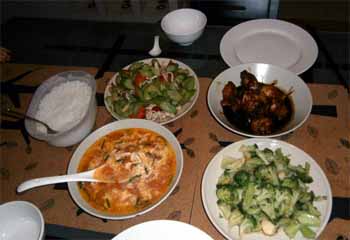
That night she made rice, two vegetable dishes that were INSANELY delicious, a soup, and some chicken wings flavored with an anise based sauce…it rocked our world. Why wasn’t she a famous chef I asked? She told me that her husband was a better cook than her, and had his own restaurant. I was like…saaaaay whaaaat? In the words of Liz Lemon, “I want to go to there.”
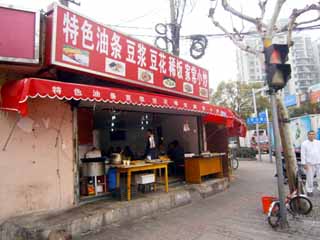
A month or so later, she took my son and me to her husband’s restaurant for lunch. It was a little dingy hole in the wall, my favorite type of restaurant. The bad news was that Wang Ayi had greatly exaggerated his skills. Her husband was not one tenth the cook she was, and his food was…well…subpar at best, but it was the thought that counted. She invited us into her world, and shared with us a private and special moment. Our son Lucas hated the food, and I ate sparingly, but it was still pretty darn cool.
That afternoon he prepared a corn dish, a few different Chinese greens, a beef and chili dish, and something reminiscent of the Farmer’s Bucket Chicken from Qibao (see my recent Thursday Review article Seven Treasures: The Allure of the Water Towns), except this was all chicken bits, bones, fat, wiggly parts, and a big black chicken foot. Yum.
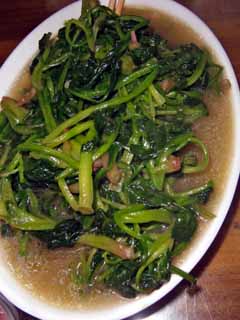

The last food memory I have with Xia Wang was the time she went on vacation to Chengdu and brought us back a special treat from the region. At that time, we had yet to visit anywhere in China as far west as Chengdu. I knew it was in the Sichuan region, and asked her to bring me something spicy, as that is what Sichuan is known for.
She came in with a package wrapped in newspaper, the same newspaper the vendor had wrapped it in a few days prior (sanitary concerns in China are nonexistent in many cases). Going into the kitchen and closing the door, she kept the treat secret until the very last moment, revealing it with a genuine smile of “look what I brought you, isn’t it amazing?” and not one of “Haha, you gotta eat this or embarrass me!” that one would expect while holding a plate full of heads.
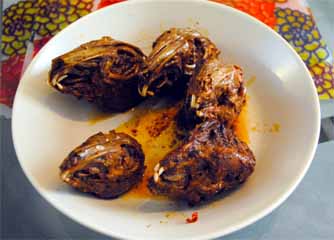
Spicy rabbit heads are a delicacy in Chengdu, often bought and eaten while walking down the street. I have since been there, and seen this first hand. In fact, almost two years after Wang Ayi treated me, the wealthy family I worked for also gifted me with some heads as they were originally from Chengdu and often returned there for visits.
The first time you eat a rabbit head, it’s not the easiest thing to do. The brains are a favorite part for many locals, so I had to try that. But other than eating the cheeks, tongue, and brain, there isn’t that much meat on them. I mean, the soft palette is pretty chewy and tasty and sometimes an eyeball or two survives the cooking, and they make decent eating. But honestly, you’ll find more meat on a chicken drumstick.
The second time I ate them I was well versed in eating unusual food, and scarfed them down with my younger brother, who was visiting me at the time. He was… not a fan. Josh wouldn’t even eat the brains.
Introducing me to things like rabbit heads and zongzi (a special treat during Duanwu, the Dragon Boat Festival), making incredible home cooked meals for us, taking us to her husband’s restaurant, babysitting our kids, and helping teach me to speak Mandarin, are just some of the memories that I’ll treasure forever about Xia Wang.
Some people may treat their ayi’s like garbage, but all four of the women that came into our home during the four years we lived in Shanghai were treated like one of the Bush Clan, no matter how short-lived their employment was. Three of them truly did become like aunts to my kids.
Among the four, Wang Ayi may not have been the best ayi we ever had, but she was the most influential in my opinion.
Related Thursday Review articles:
Seven Treasures: The Allure of the Water Towns; Michael Bush; Thursday Review; September 27, 2015.
The Long Corridor: How an American Adjusts to Living in China; Michael Bush; Thursday Review; September 19, 2015.
